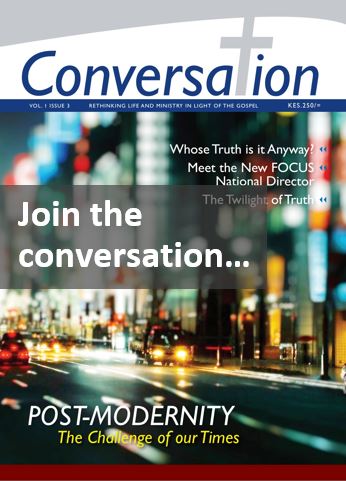
As a landscape can look quite different at different times of day or in different weather as the varying angles and hues of light on a terrain make different parts of that landscape stand out in sharp relief, so reading the Bible in a different cultural setting can highlight and bring out things you’d never seen before. I mentioned a few examples of this in an earlier post and here are a few more features of the Bible landscape that the preaching of Kenyan brothers has helped me see and appreciate in a new way.
Shame
It is sometimes said that African and Asian cultures are shame cultures (concerned about issues of public face and community rejection) whereas Western culture is a guilt culture (concerned about individual objective transgression of the law). Perhaps there is some truth in that but actually I think Western culture is a shame culture too just in a different way. Some things that would not be shameful in Kenya are shameful in the UK and vice versa. I’ll try to explore that more in another post. But what is certainly true is that when you are away from your home culture you notice the shame issue more.
When Ken Irungu was giving us an overview of 2 Timothy and preaching through the first chapter, one of the things that really struck me was how he brought out the theme of shame and being unashamed. In his time of trial Paul has been deserted (2 Tim. 4:16) and he calls Timothy ‘not to be ashamed of the gospel or of me his prisoner’ (1:8) but rather to be like Onesiphorus who was ‘not ashamed of my chains’ (1:16).
Challenging convention, being different, being outspoken can often be taken as shameful in a communal culture. To undergo arrest or punishment by the authorities, even when undeserved, will be seen as shameful. Even to suffer through illness, bereavement or some calamity can suggest that you under some sort of cloud of curse of misfortune. So for Paul to be suffering, and particularly suffering institutional persecution for the sake of his preaching, is a shameful thing and people will naturally respond by dissociating themselves and distancing themselves from him so as not to share the shame or pick the contagion. He will be rejected by the community, in itself a shameful thing, making him even more a figure of shame.
Being shown this theme has made the letter of 2 Timothy stand out in sharper relief for me. And I have also started to notice it all over the New Testament – the words ‘shame’ or ‘ashamed’ coming about 40 times. The death of Christ was a shameful thing (Heb. 12:2). The call of Jesus is to take up our cross (i.e. be willing to be shamed) and not be ashamed of me or my words else the Son of Man will be ashamed of him (Mk. 8:34-38). “Let us then go to him outside the camp, bearing the disgrace he bore” (Heb. 13:13).
Elder brother
In African cultures the role of the firstborn is well understood. I remember being in a Bible study in the Gambia looking at Colossians 1:15 and the African brothers there had no problem understanding the significance of Jesus being the ‘firstborn’. They didn’t get distracted by the JW misunderstanding that this means that Jesus is a created being, they understood that just as the firstborn in a house is next to the father and has all the rights and authority and status of the father (particularly when the father is away), so Jesus is next to the Father and has delegated to him all the functions and power of the Father.
Then Stanley Wandeto was preaching on Luke 15 – the parable of the two sons – and he showed me something that I had never seen about the elder brother there. It’s a parable full of shocking (shameful) behaviour (e.g. the younger son asking for his inheritance, the old man running, the father begging his son) but the one I hadn’t seen was that the elder brother is shocking in that he doesn’t go looking for the younger son. Traditionally a responsibility of the firstborn is to look after his younger siblings, to keep watch over them, to care for them and keep them in line. When the younger son insults his father and goes off into a life of recklessness, it is the job of the firstborn (not the father) to run after his brother and plead with him to come back.
Now I think of it, I realise that this is the godly concern that many of my Kenyan friends and colleagues have within their own families, particularly those who are firstborns, to pursue and win back straying siblings.
This gives another level and depth to the characterisation of the elder brother in the parable. His hatred towards his younger brother does not start when he comes home and a party is thrown for him, it starts much earlier in his failure to search for him. The self-righteous Pharisees (who are the target of the parable) are at fault not only for their failure to welcome sinners but their failure to go out looking for sinners (cf. Jesus who welcomes and seeks the lost).
Dead dog
Before I came to Kenya I’m not sure I’d seen a dead dog before. Now I see one almost every time I go to the office, lying in the road. Africa is full of stray dogs. Mostly a yellow-brown colour, small to medium size, thin, feral, searching for scraps. They have a hard pathetic life and then they get hit by a truck or starve.
In most African cultures, for a person to be compared to a dog is an extremely insulting and shameful thing. For one thing the distinction between animals and humans is much sharper than in the West (where pets are part of the family and people get very upset over a gorilla being shot) and for another thing dogs are a particularly dirty and ignoble animal (in contrast to something more noble like a lion or a rhino).
So when Fidel Nyikuri preached Mark 7:27 to us and also reminded us of Mephibosheth in 2 Kings 9, it came home very powerfully what it means for us to be a dead dog – pathetic, despised, dirty, base, in the lowest place. And yet – the wonder of the gospel – we who are not entitled to anything are invited to eat at the king’s table and share the children’s bread (Mk. 8:1-9).
Water and milk
In parts of the world where water comes clean, clear, pure and cold straight from the tap and is basically never cut off, it is difficult to appreciate the preciousness of water. In parts of the world where milk is delivered to the door and is always there when you open the fridge, alongside three or four other beverages and fifteen food items, it is difficult to appreciate the importance of milk.
However in places where the climate is hot and dry and water is scarce, where it has to be searched for or brought up from the ground with effort, then there is much more impact when we read in Isaiah of drawing ‘water from the wells of salvation’ (Isa. 12:3), a ruler and renewal which is ‘like streams of water in the desert’ (Isa. 32:2; 35:6; 41:18; 43:20; 44:3), a shepherd God who leads his people ‘beside springs of water’ (Isa. 49:10). Similarly, in a community where milk (drawn by hand from your own animals) is a key part of the diet (in some pastoralist communities people survive purely on milk for days a time and even down-country in many villages the one animal you will own is a cow), then the land flowing with milk and honey is very meaningful picture.
Preaching from Isaiah 55 Gerald Mwangi helped us imagine working all morning on the farm, digging in the sun, drinking nothing, and then finishing your work in the early afternoon desperate for… water. Then to think of what we take from childhood onwards to make us strong, to give us energy, to build us up… milk.
“Come, all you who are thirsty,
come to the waters;
and you who have no money,
come, buy and eat!
Come, buy wine and milk
without money and without cost.”


 terrible sinner receiving glorious grace (Isaiah 6). And then he needs to feel the divine indignation at what is crippling the church (cf. Gal. 1:6; 3:1; 4:19-20; 2 Cor. 11:2). So perhaps there is another ‘C’ – Captured by the Word – that produces the
terrible sinner receiving glorious grace (Isaiah 6). And then he needs to feel the divine indignation at what is crippling the church (cf. Gal. 1:6; 3:1; 4:19-20; 2 Cor. 11:2). So perhaps there is another ‘C’ – Captured by the Word – that produces the 

















